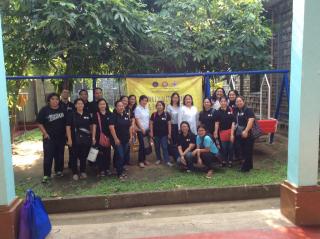This is the sixth case study from SUEUAA (Strengthening Urban Engagement in Universities in Asia and Africa), written by Dr Zenaida Reyes of the Philippine Normal University. The project is interested in how Universities in the Global South can contribute to solving geographical, economic and social issues in their cities. The project is looking at six cities in six different countries: Harare (Zimbabwe), Dar-es-Salaam (Tanzania), Johannesburg (South Africa), Manila (Philippines), Duhok (Iraq), and Sanandaj (Iran). The SUEUAA project involves academics from each of these cities, who will be carrying out fieldwork, and elite interviews with decision makers in the city and senior academics from local Universities, to better understand the ability of Universities to respond to city issues.
In this sixth case study, we look at how the Philippine Normal University in Manila is responding to the issues of gender equality and women’s empowerment.
The Philippines is the only Asian country with a high score on the Gender Gap Index (GGI). A high score on the GGI relates to the equality of access to resources, regardless of what, or how large, these resources are. Therefore, in the Philippines, men and women have similar access to resources. Underpinning this equality of access are the development of policies which focus on promoting gender equality, these have included the Philippine Development Plan for Women (1989-1992), the Philippine Plan for Gender-Responsive Development (1995-2025). In addition, the introduction of the Philippine Commission on Women, and its National Commission on the Role of Filipino Women (1975), has served as an advisory board for policies relating to women. This includes the ‘Magna Carta of Women’ (Republic Act No. 9710). The Magna Carta of Women is the first comprehensive law that focuses on pathways to gender equality and addresses women’s empowerment. The Commission on Higher Education (CHED) has ensured that all state and local universities and colleges adhere to the strict implementation of this. Based on this agreement, we see policies including the introduction of masters level programmes in Gender Studies, scholarship grants for females on male dominated course (and vice versa), and financial assistance for female students experiencing personal issues.
In the late 1980s and early 1990s, Philippine Normal University (PNU) was one of the first to offer Women’s Studies as a second subject for those students taken an undergraduate degree in Primary or Secondary Education [2]. It remained at the forefront of gender and development for many years, with the creation of a centre to focus on gender and development, initially named the Centre for Peace, Gender, and Human Rights Education, it is now titled the University Centre for Gender and Development (UCGD).
The introduction of the UCGD has also led to an increase in community engagement on gender equality and women’s empowerment in the city. It runs gender sensitivity training programmes and seminars for University staff, teachers, community leaders and citizens of the local community (barangay). The UCGD, and students of the Women Studies programme also develop action research projects with the aim to empower women in the local community. These projects involve a focus on health and wellbeing, skills, child rearing, and nutrition.
UCGD, in cooperation with the PNU Administrative Staff and the doctors, dentists, and dental staff of the PNU Health Clinic, held an extension service at Hospicio de San Jose titled, “Gender Equality and Proper Hygiene.” About 29 children in the orphanage were the beneficiaries of the said activity. The orphans were deprived of having to live with their own families because of various circumstances (e.g. abandonment, death, gender violence). It is hoped that the learning session with the young orphans will enable them to respect the rights of individuals, whatever is the sex and gender preference, and especially their own bodies which are important in building their future following the values of justice and equality. The activities took place across the course of one day. The scholars started with a storytelling of a gender-sensitive children’s literature, “Ang Sabi ni Nanay, Ang Sabi ni Tatay” ( translated: what mother told me, what father told me). It is a story about breaking traditional gendered notions of jobs or occupations. Afterwards, the PNU Health Clinic group led another session which showed child-friendly videos of how to brush one’s teeth properly. This was followed by a series of dance exercises where all the children have participated and enjoyed the activity. The session ended with a lunch, which was also an opportunity for the PNU group to bond with the children.
Feedback from the event suggested a high level of enjoyment. We anticipate that by building awareness of gender issues, public health, and social skills from an early age, the children will develop sensitivities to the rights of boys and girls, men and women within the city, and wider.
References:
- Magna Carta of Women. Retrieved from http://pcw.gov.ph/law/republic-act-9710
- Miranda, P. 2017. A report on Gender Training in the Community by the University Center for Gender and
- Development, Philippine Normal University
- PCW-NEDA-DBM Joint Circular No. 2012-01. Retrieved from http://www.pcw.gov.ph/publication/pcw-neda-dbm-joint-circular-no-2012-0…- preparation-annual-gad-plans-and-budgets-and-accomplishment-reports-implement-Magna-Carta
- Reyes, 1999: Toward a shared vision for higher education: developing an agenda for gender-fair education. Institute of Sociocultural Studies, University of Kassel, Witzenhausen, Germany, pp 211-238
- State of the Filipino women: 2015 report. 2016. The Philippines ranks high in global gender indices. Philippine Commission on Women. P. 20
- The Philippine’s Gender Gap Index (GGI). Retrieved from http://www.pcw.gov.ph/statistics/201405/philippines

